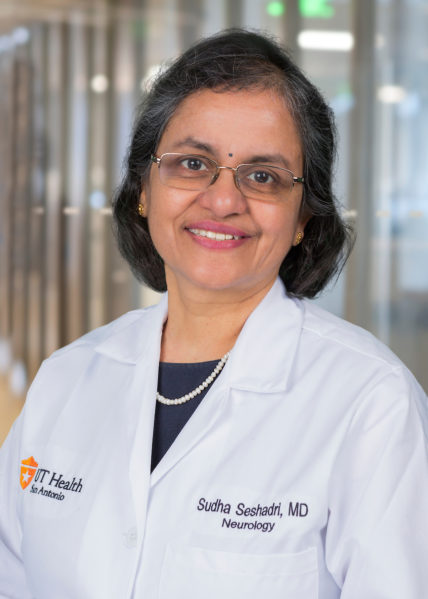The following commentary written by Sudha Seshadri, M.D., appeared in the San Antonio Express-News on Nov. 8.

On Nov. 5, 1988, President Ronald Reagan signed a joint resolution passed by Congress that designated November 1988 as National Alzheimer’s Disease Month.
The resolution referred to the “two and one-half million Americans” affected by Alzheimer’s disease and the $25 billion annual cost of nursing home admissions.
Today, 5.7 million Americans have Alzheimer’s disease, which costs the nation $277 billion a year. Nearly one-third of our seniors die with a form of dementia, and every 65 seconds, someone in our great nation develops Alzheimer’s.
Texas ranks fourth nationally in the number of Alzheimer’s cases at 380,000 and is second in Alzheimer’s-related deaths (9,135 in 2016). Mirroring a national trend, deaths among Texans with Alzheimer’s rose 180 percent between 2000 and 2015.
Hispanics, who account for 40 percent of the state’s population, have a 30 to 50 percent higher risk of developing Alzheimer’s.
More troubling, this tidal wave is intensifying.
Unless effective prevention and cures are discovered, the number of Americans living with Alzheimer’s disease is expected to nearly triple to 13.8 million by 2050. By that time, Texas families may be assisting 1 million of their loved ones affected by the disease.
Earlier this year, I discussed these issues at a meeting of the University of Texas System Board of Regents.
“Responding to the Alzheimer’s Tsunami” was the theme, which was fitting because we truly face a health care storm of immense proportions. The loss of memories and decision-making skills by those who have Alzheimer’s is only part of the toll on families. Caregivers who manage their loved ones’ affairs and daily needs experience untold stress and anxiety.
For more than two decades I’ve worked as a researcher of dementia, and I am a senior investigator in the Framingham Heart Study. This New England-based study has enrolled three generations of people since 1948. We are learning valuable insights by analyzing the health outcomes of these participants, including associations between heart health and dementia.
In December 2017, I joined UT Health San Antonio to serve as the founding director of the new Glenn Biggs Institute for Alzheimer’s and Neurodegenerative Diseases.
The Biggs Institute, backed by $50 million raised from the San Antonio community, will tackle the Alzheimer’s challenge from all sides — by caring for caregivers, by providing novel therapies in clinical trials, by understanding risk factors in Hispanics, and by identifying molecular signatures of the disease and new pathways to prevent and treat it.
The Biggs Institute is an all-out commitment to quelling the rising tsunami. We do it for patients and families, in memory of a great friend to the San Antonio community, Glenn Biggs.
Known for his dedication and service to the community, Mr. Biggs was a prominent figure whose leadership influenced economic development across San Antonio. When he was diagnosed with Alzheimer’s disease, he and his family struggled to find comprehensive care.
This search led him to approach UT Health San Antonio President William L. Henrich and many other community leaders to address the need for a comprehensive center dedicated to understanding Alzheimer’s disease.
His vision of a center to transform care and advance discovery is now the Biggs Institute at UT Health San Antonio.
Partnering with the community, we at the Biggs Institute will respond to the Alzheimer’s tsunami by understanding the biology of this complex disease, which will lead us to ways of preventing it and delivering personalized treatment.
Our children and grandchildren will be the beneficiaries.
Sudha Seshadri, M.D., is professor of neurology at UT Health San Antonio and founding director of the Glenn Biggs Institute for Alzheimer’s and Neurodegenerative Diseases. Dr. Seshadri holds the Robert R. Barker Distinguished University Chair for the Director of the Institute for Alzheimer’s and Neurodegenerative Diseases, and the USAA Foundation President’s Distinguished University Chair in Neurosciences.
Free event Nov. 15, Dialogue on Dementia: “Changing Behaviors in Persons with Frontotemporal Dementia and Lewy Body Dementia”


